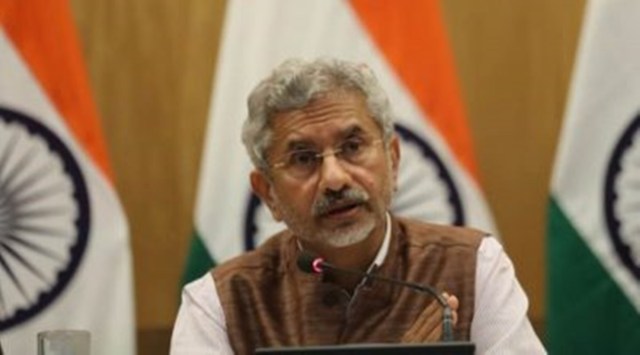DAYS after Russian Foreign minister Sergey Lavrov echoed Beijing’s description of the Quad grouping as an “Asian NATO”, India, France and Australia underlined their common ground on the Indo-Pacific even as they marked their differences on Myanmar.
External Affairs Minister S Jaishankar Wednesday said those using terms like “Asian NATO” are playing “mind games” and New Delhi will not have others “veto” on what is it going to discuss, and with whom.

“So, that kind of NATO mentality has never been India’s. If it has been there in Asia before, I think it’s in other countries and regions — not in mine,”
Story continues below this ad
Jaishankar said at a session with French Foreign Minister Jean-Yves Le Drian and Australian Foreign Minister Marise Ann Payne at the Raisina Dialogue.
While Le Drian said the three countries (France, India and Australia) were “certainly not into any sort of a military institution or format,” Payne said the three are “very sound examples” of working together in the broad Indo-Pacific.
Explaining the “practical thread” to this work, Payne underscored the principle behind it: “the value of…three such strong democracies like ours, having the capacity to share our views and share our responses to the pressures that are on regional multilateral institutions.”
ExplainedTightrope walk on Myanmar
While it has expressed support for restoration of democracy, New Delhi has maintained ties with the Myanmar military regime. This is behind India’s reference to its “unique” position on Myanmar.
She said that the challenges came from those who are against the “rules-based order,” and called for a “practical” and “flexible” approach in responding to it.
Story continues below this ad
“I would argue that, in a way, Indo Pacific is a sort of return to history. It reflects the more contemporary world, it is actually overcoming the Cold War, not reinforcing it. So I would very much hope that all of us who would like to run contemporary foreign policies look at it that way,” said Jaishankar.
The three ministers were scheduled to have an in-person meeting in Delhi but Payne cancelled her visit after the second Covid wave forced organisers to shift the Raisina Dialogue (April 13-16) into a virtual format.
While there were convergences on the Indo-Pacific — all three used the same formulation — the ministers’ views reflected deep divergences on the unfolding situation in Myanmar.
Le Drian said that there is a “lot of solidarity” with Aung San Suu Kyi and the government that was “properly elected”. He underlined the “protests against the behaviour of the (military) junta that came out of the coup and that are continuing with their violent action in a more and more serious manner”.
Story continues below this ad
Stressing that the European Union has adopted sanctions against the Myanmar’s military regime, he said they have put an end to all assistance to the Myanmar government. “I believe this is a serious attack against democracy in the southeast of Asia, and we need to maintain international pressure”, he said.
Payne emphasized the importance of working with ASEAN on identifying solutions in response to the military coup.
“The increase in violence and the increasing number of deaths are deeply concerning,” she said. “I strongly support the bringing together of an ASEAN leaders meeting in the coming week, that will occur early next week. And I would hope that that has the ability to press upon Myanmar…the cessation of the use of armed force against civilians, and for a very, very focused examination of the options for a way forward,” Payne said.
Jaishankar struck a cautious note saying that while all democratic countries have a common position, “we are located differently and our relationships with Myanmar are each unique”.
Story continues below this ad
Articulating India’s balancing act, he said, “We also have a unique position. So, we are seized of it, both bilaterally and we have a long border and we engage with all parties in Myanmar very very intensively. I should also share with you that we are in fairly regular touch with the ASEAN, in terms of what they’re doing as indeed….all of us will have to find ways of coming together and each sort of doing what they are good at, in trying to find what is a common solution.”









